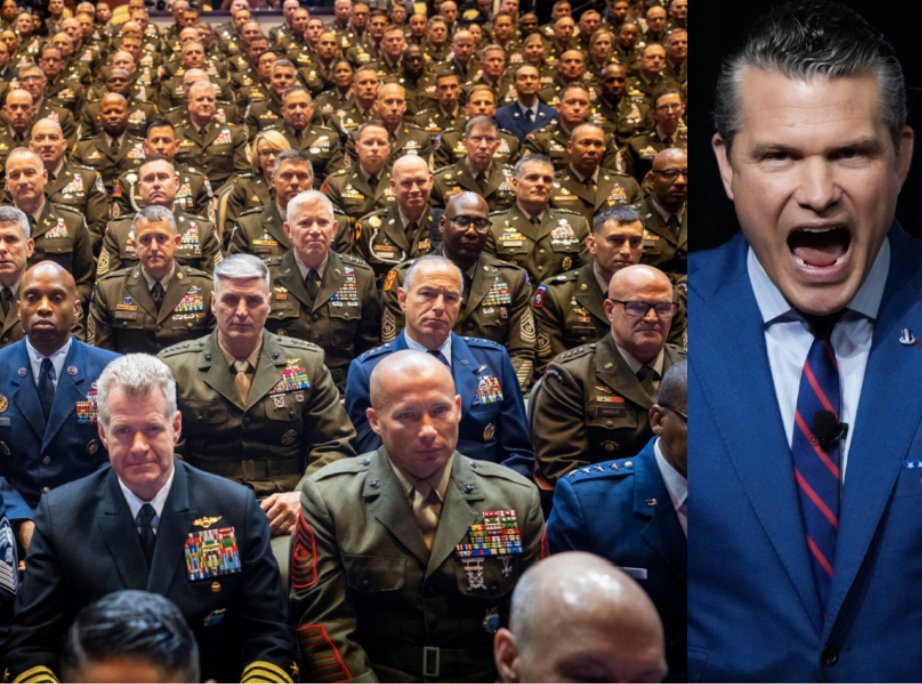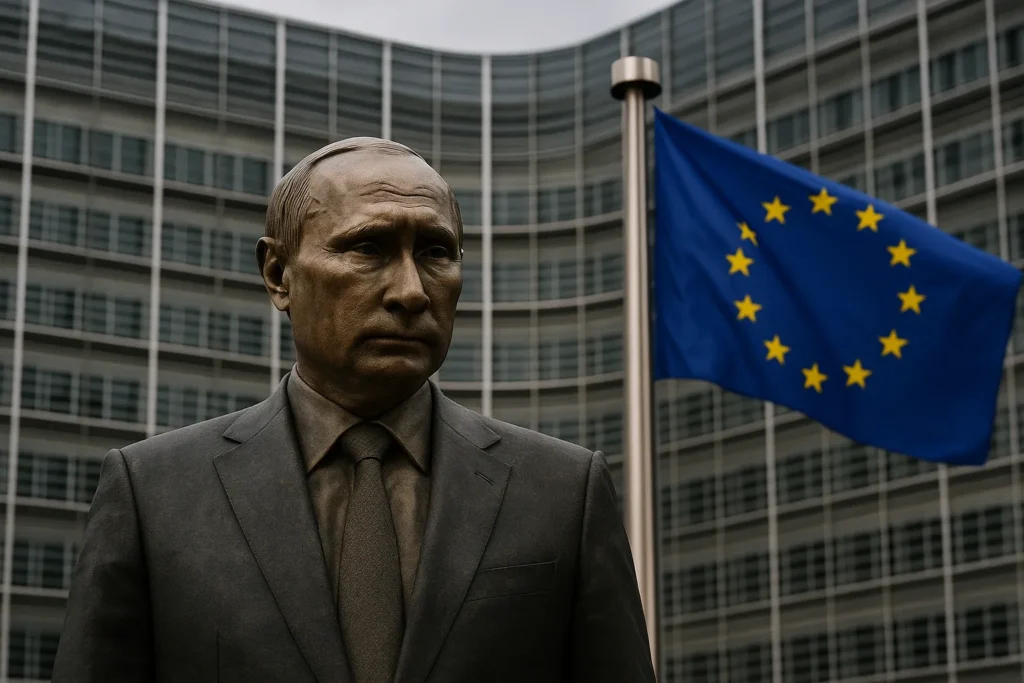When the “top brass” of the U.S. military start leaking against their own Defense Secretary, the problem is no longer a matter of public image — it’s a matter of survival. The Pete Hegseth career collapse has arrived faster than anyone inside the Pentagon expected. Sources describe a “chaotic, vindictive” environment where loyalty is prized above competence, and even conservative media outlets that once cheered him on are now breaking ranks.
The story, first reported by The Washington Times, marks a turning point: Hegseth has not only lost the confidence of America’s generals — he’s lost their respect. And in military culture, that’s a death sentence.
Context: a Pentagon built on personality, not policy
Pete Hegseth’s appointment was political theater disguised as leadership. A Fox News personality handpicked by Donald Trump for loyalty, not experience, he entered the Pentagon as a culture warrior rather than a strategist.
Last month’s high-profile speech to generals and admirals — a stage he imagined would cement his authority — instead detonated his credibility. Instead of addressing doctrine, readiness, or global threats, he ranted about “fat generals,” “wokeness,” and “f*cking haircuts.”
According to The Washington Times, even sympathetic officers left the hall shaking their heads. “If he ever had us, he lost us,” one general said. Another described the event as “a massive waste of time.”
That’s not opposition from liberal circles. These were seasoned commanders — many of them conservatives — speaking to a right-leaning publication. Their decision to leak through such a channel underscores how deep the fracture runs.
For years, Hegseth presented himself as the voice of patriotic common sense. But what’s unfolding inside the Pentagon isn’t patriotism. It’s a collapse of professionalism masked by slogans.
Oppositional Argument: the rot beneath the rhetoric
Mainstream conservative media will frame this as a “communication breakdown.” It’s not. It’s an implosion of leadership.
The Pete Hegseth career collapse represents the logical end of politicizing the military. When loyalty replaces merit, chaos becomes policy. Insiders describe an institution bleeding talent: senior officers sidelined for questioning orders, staff fired overnight for no reason, civilians fleeing the building in despair.
One former Defense Department official described it bluntly: “Leadershipwise, the level of chaos is unprecedented.”
And yet, this chaos didn’t appear overnight. Trump’s Pentagon was engineered for control — not coordination. Each appointment was meant to ensure ideological alignment, not operational integrity. Hegseth fit that mold perfectly: combative on television, insecure in command.
His obsession with “wokeness” and “optics” reduced defense policy to grievance politics. He treated the Pentagon not as an institution of national security, but as a platform for performative culture wars.
The result? A leadership vacuum filled with paranoia.
Analytical Breakdown: why the military turned
To understand this backlash, one must look at the psychology of military leadership. Generals may tolerate eccentricity — they do not tolerate incompetence.
When Hegseth summoned global commanders to Washington, most expected a serious briefing on restructuring, strategic modernization, or Pacific posture. Instead, they got a sermon about grooming standards and social media discipline.
The optics were catastrophic. “Not about f*cking haircuts,” one general snapped to the Times. That single quote became emblematic — a summary of everything wrong with Hegseth’s tenure.
What the leaks reveal is a rare phenomenon: open insubordination from the officer class. They’ve stopped believing in his leadership. That’s institutional breakdown.
According to multiple sources, the Pentagon’s senior staff now operates in silos, circumventing Hegseth’s office to prevent delays and impulsive reversals. The Defense Secretary’s inner circle — a handful of loyalists including Sean Parnell and Hegseth’s family members — vets even routine communications.
This isolation has crippled policy development. No major strategic directives have passed through normal channels in weeks. The military’s planning staff, usually the engine of long-term defense readiness, now describes itself as “frozen.”
A Fox News general without a strategy
Hegseth’s downfall reflects a broader American decay — the replacement of expertise with entertainment. His fame came not from commanding troops, but from commanding airtime. Trump’s affection for cable news created a cabinet of commentators, not commanders.
Insiders describe Hegseth as “a junior officer with a megaphone,” obsessed with controlling headlines rather than outcomes. His enemies aren’t foreign powers but internal critics. His priorities — haircuts, tweets, “fat generals” — reveal insecurity, not leadership.
And yet, this caricature holds real power. When institutions reward loyalty over logic, television becomes a credential.
Human Perspective: the cost of chaos inside the ranks
While media outlets frame this as palace intrigue, the human cost inside the armed forces is profound. Officers speak of “bleeding talent” — capable leaders leaving or being purged for political reasons.
“There are people being held back from promotions, or removed for unknown reasons,” said one senior officer. “It seems like it’s all about one guy here.”
Morale is deteriorating. Even junior service members sense the dysfunction. Promotions once based on merit now depend on proximity to the Secretary’s allies. Strategy meetings devolve into loyalty tests.
One former Defense official recalled “people fired overnight for no reason,” and new hires “brought in with no clear role.” The result, they said, was “general unprofessionalism and mistrust.”
These are not liberal critiques — they are conservative professionals describing a building in freefall.
In private conversations, several officers admitted they now avoid sharing honest assessments for fear of reprisal. “He doesn’t want advice,” one said. “He wants applause.”
Counterarguments
Defenders of Pete Hegseth claim he’s cleaning up a bureaucratic swamp resistant to reform. They argue that his bluntness challenges a stagnant hierarchy and brings “real-world grit” to the Pentagon.
But this defense collapses under scrutiny. True reform requires trust, not fear. Commanders don’t follow leaders who humiliate them publicly. You can’t build discipline through mockery.
Even The Washington Times — hardly a liberal publication — published the criticisms. That editorial choice speaks volumes: when the right starts leaking to its own press, the subject isn’t reform; it’s rebellion.
The political theater of loyalty
The Pete Hegseth career collapse reveals something larger than one man’s downfall. It exposes the corrosion of America’s defense leadership under politicized control.
Trump’s appointments often valued loyalty above competence, and Hegseth’s position was the logical endpoint of that philosophy. Every institution he touched became a stage. His Pentagon isn’t an organization; it’s a performance.
But performances have consequences. Real-world threats — from Russia’s hybrid warfare to China’s Pacific buildup — don’t wait for ideological theatrics to end. Every day spent in internal chaos erodes deterrence.
When a Secretary of Defense alienates his generals, the system’s deterrent credibility collapses. Adversaries see the disunity. Allies sense the drift.
That’s not culture war. That’s national vulnerability.
Insider revelations: the shrinking circle
According to former Pentagon officials, Hegseth now operates within a “tight, insulated circle.” He trusts only a handful of advisers — his wife, his brother, and a few political allies.
This isolation mirrors Trump’s own executive style. Decisions bypass traditional vetting. Career officers are excluded. National security strategies are drafted in echo chambers.
“My understanding is now he’s insulated himself,” one source said, “and isn’t utilizing the Pentagon as previous defense secretaries have.”
That’s how institutions crumble — not through coups, but through neglect.
In recent months, even conservative think tanks that once praised Hegseth’s patriotism have gone silent. The silence is louder than condemnation. It signals calculation: no one wants to be seen defending a sinking ship.
The collapse of command credibility
Leadership is built on two currencies: trust and respect. Hegseth has squandered both. His rants about “wokeness” may thrill partisan audiences, but they demoralize those sworn to serve under him.
In military culture, words matter. The moment a Secretary of Defense becomes a punchline among officers, his authority evaporates. Leaks like these are not gossip; they are institutional warning flares.
Multiple generals described his tenure as “embarrassing,” “below our institution,” and “dangerously unprofessional.” That language, in Pentagon terms, is mutiny in prose.
One officer summed it up: “We are bleeding talent for what appears to be the opposite of a meritocracy.”
That statement encapsulates the tragedy. A military that once prided itself on professionalism is being hollowed out by vanity.
Conclusion: the anatomy of a collapse
The Pete Hegseth career collapse isn’t a scandal. It’s a systemic diagnosis. It reveals what happens when the U.S. military — the world’s most disciplined institution — is treated as a partisan prop.
Hegseth’s downfall was inevitable. You can’t command respect when you mistake attention for authority. You can’t lead soldiers when your focus is TV ratings instead of troop readiness.
His tenure will be remembered as the moment when America’s defense leadership turned inward — obsessed with loyalty, blind to competence, deaf to reason.
He may cling to his position for now, insulated by Trump’s patronage, but the verdict inside the ranks is final. “If he ever had us,” one general said, “he lost us.”
And with that loss, he’s taken the Pentagon’s integrity with him.
External Links
33 views





